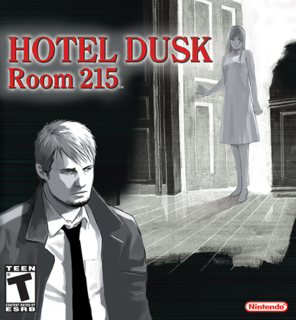Hotel Dusk is a noir adventure game featuring compelling characters, a mature storyline, and plenty of adult charm.
In the center of that story is a man named Kyle Hyde, an ex-NYPD detective that's spent the previous three years searching for his former partner. In the meantime, he works as a door-to-door salesman for a company run by a family friend, and is occasionally asked by his boss to hunt down missing items that clients want found while remaining under the radar. One such assignment brings Kyle to Hotel Dusk, a rundown hotel that, through coincidence or design, may hold the answers that he's looking for.
At the basic level, Hotel Dusk plays very similarly to Trace Memory. The player still moves around and interacts with the environment using the touch screen, but the DS is now held like a book. The game's puzzles are solved using the various components of the DS, including the the touch screen, microphone, and even sleep mode. Each chapter concludes with Kyle asking himself a series of questions regarding recent events, although none of them are meant to be particularly challenging; they're really just there to make sure that the player has been paying attention.
Where Hotel Dusk differentiates itself from Trace Memory's gameplay is in the underlying structure of conversing with other characters. Most of the game's key moments are brought about as Kyle interrogates the various hotel patrons and employees, and the questions asked could lead to answers, or a firm boot out the door. Unlike Trace Memory, it's possible to achieve a "Game Over" if Kyle says the wrong thing or presents the wrong item to the wrong person, resulting in him either being tossed out of the hotel or forcing him to stay put in his room.
Those elements aside, where Hotel Dusk truly shines is in its story and presentation. Even though it is a T-rated game like Trace Memory, Hotel Dusk is by far a more mature experience. Kyle is not the same sort of character as Trace Memory's adventurous young teen protagonist, Ashley. He's a grown man surrounded by other adults, all of whom have their own reasons for being at Hotel Dusk. Rather than being dumbed down for younger audiences, they talk and act like real adults. The personalities are all very diverse, and not one of them feels superfluous to the nature of the story.
The game's graphics are fairly detailed and look great. The characters are all depicted in an animated sketch-like manner that shows off each of their various mannerisms and expressions with striking detail. The hotel itself is about what one could expect. All of the rooms are fashioned cleanly with numerous small details that add personality to the environment, particularly to the guest rooms, which are naturally very similar to one another. As a whole, the hotel isn't very large, and so when the player is tasked with retrieving an item or speaking with a character on the opposite end of the building, it won't take long to get there.
The sound effects in Hotel Dusk are clear, clean, and appropriate. Although there isn't any voice in the game, the puzzles and environment feature an assortment of appropriate sound effects. The music is light and jazzy, which fits the noir-tone of the game, but most of the soundtrack isn't particularly memorable.
If there's are any real knocks against Hotel Dusk, its that the game suffers from issues found in most graphic adventure games. Locating the occasional hard-to-find item can become tedious and bog the pace down, and players may be tempted to overthink some puzzles when the answer is more straight-forward. Still, the crimes the game commits are minimal and shared by most every game in the genre, and so fans of adventure games should find little reason to complain. To the game's credit, Hotel Dusk does eliminate a problem present in Trace Memory, in which the player was forced to locate a puzzle before being allowed to pick up a relevant item.
Hotel Dusk is one of the best titles in the growing library of DS adventure games. Fans of Trace Memory will find an arguably more enjoyable experience, and newcomers to Cing's formula should easily be able to slide into Kyle's shoes and start solving the hotel's many mysteries. With its colorful cast, intriguing presentation, and top-notch story, Hotel Dusk is highly recommended.

